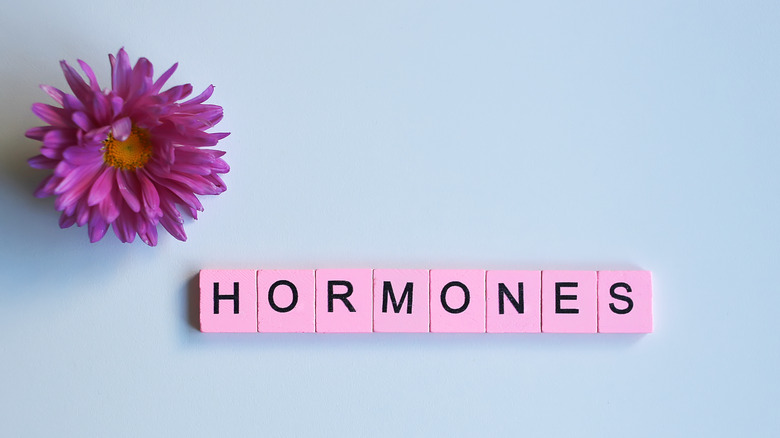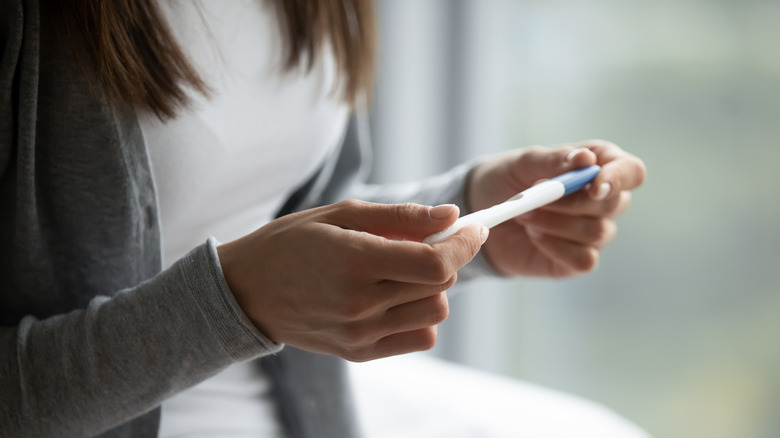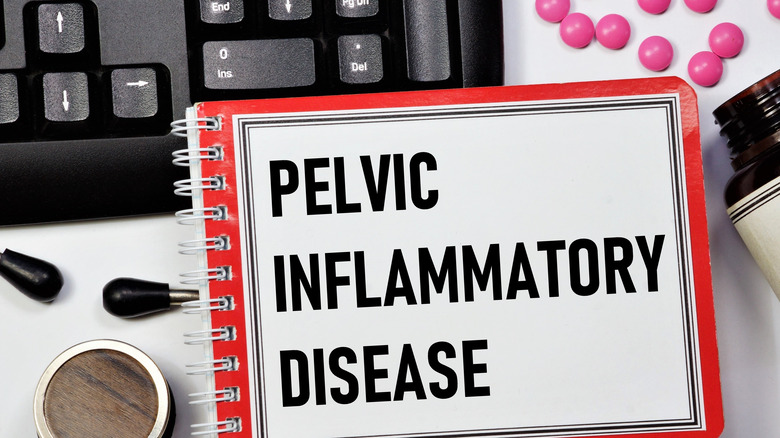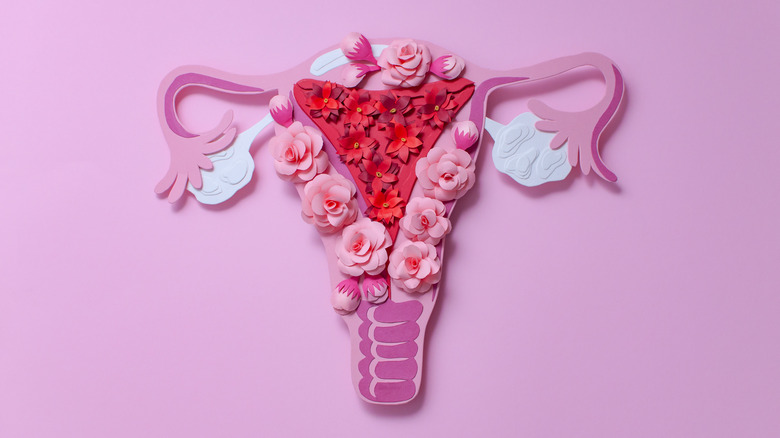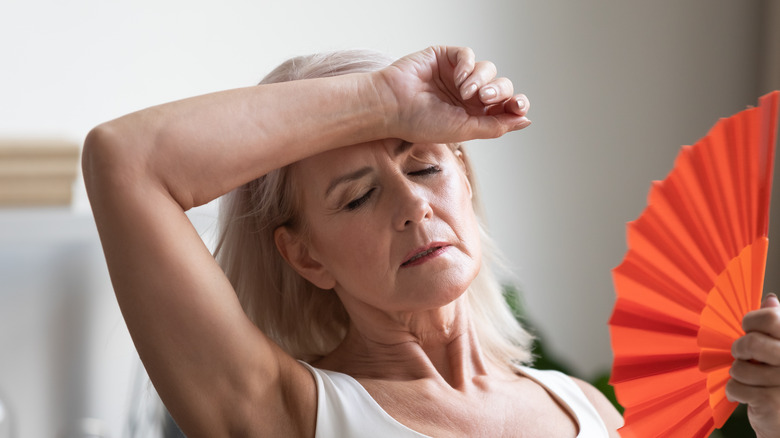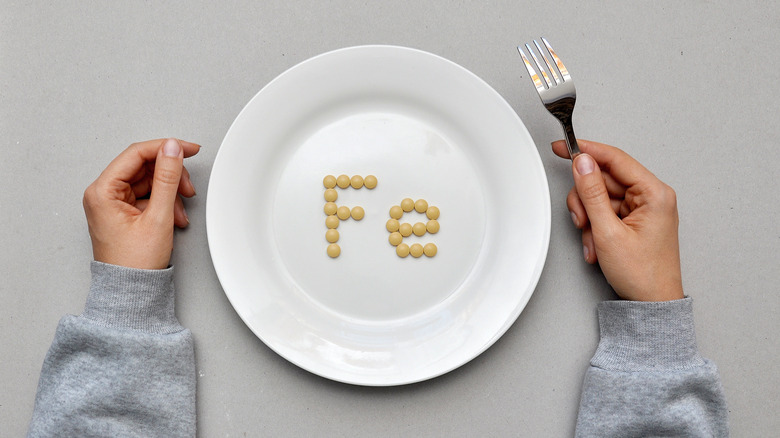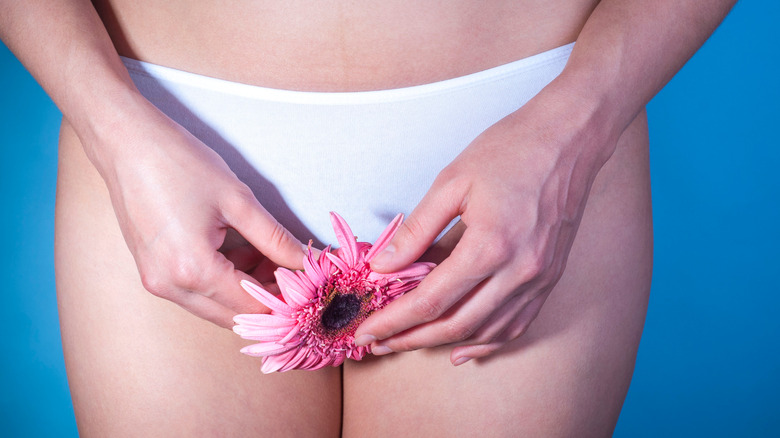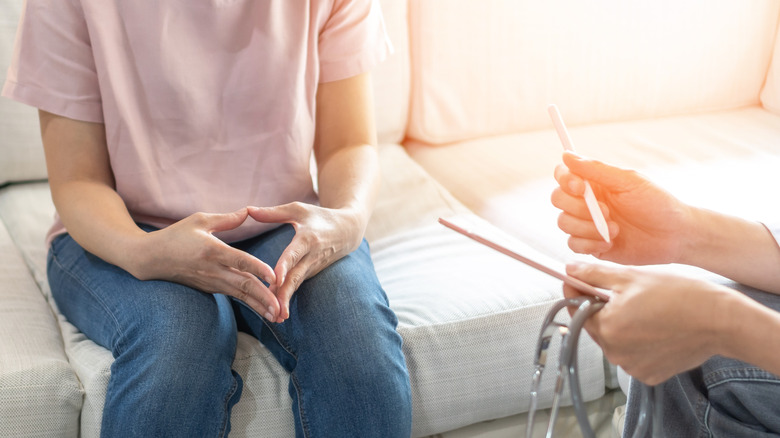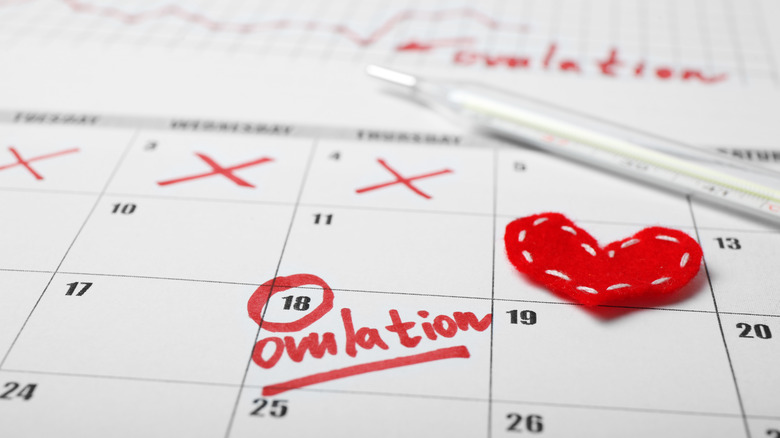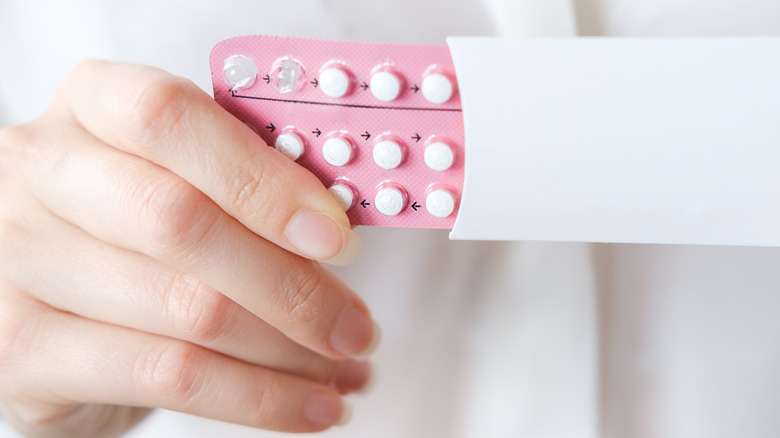What Your Period Can Tell You About Your Health
With your calendar probably already overflowing with to-do's, it might seem annoying to keep track of yet another monthly event. However, paying attention to your monthly cycle may end up paying off in the long run in a number of ways. There is a lot of information encoded in your menstrual cycle that can help you learn about your body — and having a rough idea of what to expect every month can alert you to any underlying issues. According to the Mayo Clinic, a menstrual cycle refers to the cycle of hormonal changes that the female body goes through each month to prepare for a potential pregnancy.
While the length of a menstrual cycle will vary from person to person, a healthy menstrual cycle lasts between 21 and 35 days, notes the Mayo Clinic. Taking that subtle variation into account, there are more alarming deviations from what you consider to be your monthly normal that could be cause for concern. While these changes might just be hormonal fluctuations, it can also signal something much more serious. Continue reading to learn more about what your period might be trying to tell you about your health.
You're stressed
Stress is a natural part of the human experience, and at certain levels can even be healthy (via Verywell Mind). However, not all stress is created equal, and in large amounts or spread out over a long period of time it can end up negatively affecting your body. According to the Cleveland Clinic, stress can cause deviations in your menstruation by delaying it, lightening it, or causing you to miss it completely. Experts at the clinic explain that the part of the brain that is in charge of regulating your monthly cycle — the hypothalamus — is sensitive to stress, sleep cycles, and even exercise.
Cortisol, the hormone your body pumps out when under stress, can directly affect the hypothalamus, creating a trickle-down effect to your period. So how much stress is enough to create issues? Dr. Swapna Kollikonda, Ob/gyn, spoke to the Cleveland Clinic and explained, "There's a continuum. Lighter stress may have lesser impacts, and heavy stress may have more dramatic impacts that last longer. The higher your cortisol levels, the more likely you are to have missing or irregular periods." If you've missed more than three periods in a row, it might be time to visit your doctor for stress management tips, or hormonal intervention.
Imbalanced hormones
Hormones are responsible for a wide range of processes in the body, your menstrual cycle being one of them. According to Healthline, hormones act as the body's "messenger system," and when there is even the slightest imbalance in your hormone levels they can disrupt everyday processes. Experts at the site explain that certain events such as puberty, pregnancy, menopause, and breastfeeding can trigger fluctuations in hormone levels, and that this is normal. Some of the side effects triggered by these hormonal changes include the appearance of acne, hair loss, weight gain, and of course, irregular periods.
Aside from the aforementioned major changes, other health concerns that might trigger hormonal imbalances include diabetes, medications, issues with your thyroid, and even tumors. If you suspect a hormonal imbalance may be the cause of your irregular periods, Healthline suggests visiting your doctor so they can run tests on your hormone levels and help you get them back on track. To do so, experts say your doctor may prescribe different types of hormone therapy such as birth control in the form of rings, patches, or shots, or may even suggest weight loss or diet changes to help.
You could be pregnant
If you've ever sighed in deep relief at the arrival of your monthly cycle knowing that you are indeed, not pregnant, then you already have a basic understanding of how this one works. Or are you one of the many women who continue worrying after you've begun menstruating and wonder, "Could I still be pregnant?" According to Healthline, the answer is a firm no. Experts note that it is clinically impossible to have your period and be pregnant at the same time. So how is that, exactly? Every month, one of your ovaries releases an egg, and if that egg has not been fertilized, the lining of your uterus sheds, which is what is referred to as menstruation.
Healthline explains that during a healthy period, the bleeding starts out lighter, then gets heavier, and gets lighter again toward the end. However, it is possible to be pregnant and experience bleeding for other reasons, which is where some confusion may lay. Spotting during the first trimester of pregnancy is not uncommon, but the color is usually pink to dark brown, according to the site. Other reasons you might bleed could be more serious, so you should call your doctor right away if you have concerns.
A sign of pelvic inflammatory disease
Pelvic inflammatory disease (PID) is a potentially very serious condition that is most often caused from a sexually-transmitted infection that has made its way from the vagina to the fallopian tubes, and spread to the pelvis (via Verywell Family). The disease is serious because it infects the female reproductive organs and can eventually lead to infertility. According to Verywell Family, symptoms of PID can be similar to other conditions, such as endometriosis and appendicitis, and can range from being very subtle, to requiring emergency intervention.
Some of the more noticeable symptoms of the disease include fever over 101 degrees Fahrenheit, pain in the lower abdomen and lower back, pain during intercourse, and irregular periods. According to the experts at Verywell Family, if you are experiencing bleeding heavier than what is normal for you, or if you are spotting between cycles, it could potentially signal PID. This could mean needing to change your pad every hour for "more than two or three hours," according to the site — and if this is the case, it's best to call your doctor as soon as possible.
Polycystic ovary syndrome
Another condition your monthly cycle can alert you to is polycystic ovary syndrome (PCOS). PCOS is caused by an imbalance in hormones and is known to affect anywhere between 12% to 21% of women in their reproductive years, according to Northside Gynaecology. Experts at the clinic say PCOS has a range of symptoms, and can potentially lead to infertility. Common symptoms include hair loss, constant fatigue, and irregular periods. The way PCOS can affect periods is varied, but one of the first symptoms noted is consistently irregular periods.
While again, some variation in your cycle can be normal, having eight or fewer periods within a year could be a symptom of PCOS. Another symptom of PCOS is having no periods at all, which is defined as amenorrhea. This means that no egg is being released, which is why PCOS is said to lead to infertility. On the other end of the spectrum, women who have PCOS may actually experience very heavy and painful periods, known as menorrhagia, which is a result of low progesterone levels caused by PCOS. Some of these symptoms can also be associated with other conditions including endometriosis, so it's important to get checked out by your doctor to be sure.
Uterine fibroids
According to the U.S. Department of Health & Human Services, uterine fibroids affect 20% to 80% of women before the age of 50, and are more common in black women aged 30 to 40. While fibroids can be asymptomatic, some women may experience lower back pain, painful sex, pressure on the bladder and bowels, long, heavy and painful periods, and potentially miscarriage and infertility.
Fibroids can be located in the uterine wall and inside the uterine cavity, which puts pressure on the lining of the uterus, according to Everyday Health. The lining that is shed during your period is thickened because of this, which creates a heavier period. Dr. Linda Bradley, director of the Fibroid and Menstrual Disorders Center at Cleveland Clinic spoke to Everyday Health and explained why this leads to pain. "For women who bleed a lot, large clots can form. As all of this blood and clotting is trying to come through the narrow cervix and be expelled from the body, the uterus is contracting more, which can cause pain."
The site suggests pain relievers, hormonal birth control, and other therapies such as massage and acupuncture to manage the pain.
A possible sign of menopause
By definition, menopause is a natural, biological point in a woman's life where she stops menstruating completely (via the Mayo Clinic). According to the Mayo Clinic, the average age when menopause starts in the United States is 51, but it can also begin in a woman's 40s. The phase leading up to menopause is called perimenopause — and this can start as early as in a woman's mid-30s. During this time as estrogen levels fluctuate, the length of your period may also vary widely, and it may also be possible to experience menstrual cycles in which you don't ovulate. You may also miss a few periods during this time, according to the site. Missing a period for 60 days is likely a sign of late perimenopause, while the official marker for entering menopause is having gone without a period for 12 back-to-back months.
Experts at the clinic say that irregular periods are normal during this time, and typically nothing to worry about. However, if you are experiencing heavy bleeding, or bleeding between periods, it may be something else that requires a visit to the doctor. Other symptoms of perimenopause include hot flashes, issues with sleeping, mood swings, vaginal dryness, and fluctuations in cholesterol levels.
Iron deficiency
Iron deficiency, which can also be known as iron deficiency anemia, is a blood disorder where you lack the proper amount of red blood cells in your body (via Healthline). Red blood cells are responsible for transporting oxygen to all of your tissues, which is helped along by a protein called hemoglobin.
Iron is what helps produce hemoglobin in the body, so a lack of iron means a lack of hemoglobin, meaning a lack of proper oxygen in the body. According to experts at Healthline, anemia can occur because of a loss of blood from heavy periods, which affect one in five women in the United States. If you end up losing more red blood cells during your period than your body is able to make up, you will lose iron, and thus hemoglobin. Symptoms of heavy periods include needing to change pads or tampons every hour for hours on end, having to change pads or tampons at night, passing blood clots that are larger than a quarter, and feeling weak when having your period.
Physical symptoms of iron deficiency include weakness, fatigue, headaches, and feeling dizzy. If you suspect you are experiencing anemia, be sure to visit your doctor to get a blood test. Remedies include adding more iron-rich foods to your diet, taking iron supplements, and eating foods that support iron absorption.
Sexually transmitted infection
While most of the symptoms in this list have covered things that happen during your period, research from Oxford University suggests that fluctuations in premenstrual syndrome (PMS) may also be signaling that something in your body is off. A report published by Science News details the findings of the study, which was originally published in Evolution, Medicine, & Public Health, and explains that undiagnosed sexually transmitted infections (STIs) can worsen PMS symptoms. The study used polled data from a period tracker app, in which users were asked if they had ever been diagnosed with an STI and if and when they received treatment.
Based on this information and combined with data that users entered about PMS symptoms, pain, and length of period, the study discovered that the women who had infections such as chlamydia, herpes, or HPV were double as likely to report PMS symptoms such as headaches, cramps, and mood swings — as well as high sensitivity during their cycle. PMS symptoms are not specifically indicative of an STI, so if you are experiencing abnormal PMS symptoms and suspect you have an STI, it is best to check with your doctor before making any assumptions.
Possible signs of endometriosis
According to the National Women's Health Network, endometriosis is a condition where the lining that would normally grow inside of the uterus and shed during menstruation grows outside of the uterus instead. Experts explain that the lining can get stuck to the ovaries and create cysts. Period pain from endometriosis typically starts before your cycle begins — and when your period arrives, it will typically be more painful and may be accompanied by excessive bleeding.
Because endometriosis causes the production of additional lining, periods may last longer as this additional lining is shed. There may also be fewer days between each cycle, and pain and bleeding during ovulation may occur as well. According to Medical News Today, other symptoms of endometriosis include persistent lower back and pelvic pain, problems with bowel movements and the urinary tract, pain during sex, spotting between periods, and nausea. While there is no cure for endometriosis, treatment options are available — these include pain medication, hormonal treatment, as well as natural options including acupuncture, herbal medicine, and light exercise.
When you're most fertile
If you're looking to get pregnant, one of the best ways to do it successfully is to track your ovulation. By knowing when you are ovulating each month, you'll know when to have sex with your partner to increase your chances of pregnancy (via WebMD). Start by marking down when your period begins and ends. For a woman with an average 28-day cycle, ovulation typically occurs on day 14 of your cycle. However, "Your fertile window begins on day 10. You're more likely to get pregnant if you have sex at least every other day between days 10 and 14 of a 28-day cycle," according to WebMD.
And while women tend to ovulate mid-way through their cycle, each woman is different, so it's best to pay attention to your unique signs. Other symptoms of ovulation include sore breasts, cramps, and even a twinge of pain where your ovaries are. Experts also note that the texture of your cervical mucus will change, as well as your basal temperature, which can be tracked with a special thermometer.
You might be underweight
While being aware of what you eat and trying to maintain a healthy weight are good overall goals, it's possible to take weight loss too far. Losing too much weight can have serious consequences on your health, and negatively affecting your menstrual cycle is one of them. According to Everyday Health, other side effects of being underweight include reduced blood pressure, kidney stones, and heart palpitations.
Experts explain that the pituitary gland and the hypothalamus are responsible for sending signals to the ovaries to produce estrogen and progesterone, the two hormones responsible for ovulation. If a woman is underweight, the starvation will actually suppress the signals sent by the hypothalamus and may completely stop her from producing estrogen, and thus from ovulating. Because having a period is based on ovulation, being chronically underweight can eventually impact whether or not a woman gets her period.
On the other end, it's also possible to experience irregular periods if you are overweight. According to Verywell Health, being overweight can interfere with the hormones that contribute to ovulation. To know whether or not you are at a healthy weight the site suggests evaluating your body mass index (BMI) instead of just looking at the number on the scale.
Exercising too much
When beginning a new exercise routine, it's normal to experience a lot of changes in your body. While some of these changes may be desired, others, well, not so much. According to experts at Verywell Health, exercising may affect the way your period comes every month, and may cause spotting, missed periods, late periods, and changes in your flow.
If you begin a regular exercise routine it may impact your hormone levels, which can then trigger your uterus to shed its lining after you have your "normal" period, which is called spotting. Verywell Health also points out that spotting can occur because of an issue with the endometrium, or from more physical changes to the uterus or cervix. Furthermore, additional pressure from exercising may contribute to fibroids or polyps, which can also cause bleeding outside of your period. Experts add that similarly to what happens with extreme weight loss, extreme exercise can cause stress on the body which affects the hypothalamus' ability to produce estrogen, leading to no ovulation.
However, not all changes are bad: According to the site, losing weight can help you reduce the lining your uterus produces, thus lightening your flow.
Whether or not your birth control is working
If you're someone who is simply not a fan of getting your period each month and have ever wondered if there was a way to stop it completely — well, there is. According to WebMD, there are ways to stop your period for long periods of time, even years, by using birth control, which the site refers to as "menstrual suppression." WebMD explains that birth control pills contain two hormones — and most come in a pack that contain pills with the hormones, and pills without. If you wanted to stop your period, you would just skip the placebos altogether and only take the hormonal pills until you wanted to have your period, experts explain.
Inserting an Intrauterine Device (IUD) is another way women can stop their periods or reduce their heaviness. Experts at WebMD explain that IUD's that contain the hormone progestin is what helps reduce heavy bleeding, and that 50% of women who insert an IUD will no longer have periods after six months, while 25% will simply experience a reduction in occurrence. Other options include patches, vaginal rings, implants, and shots — the last of which is the most effective, reducing the chance of experiencing your period by 75%.



